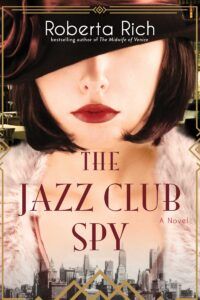Val's Book Reviews

The Jazz Club Spy
By Roberta Rich
Toronto: Simon & Schuster Canada, 2023
$24.99 / 9781982187729

With her usual meticulous historical research and her incredible gift for storytelling, you always know you are in for a treat when you start reading one of Roberta Rich’s books. Her latest, The Jazz Club Spy is no exception.
Rich (A Trial in Venice) begins the story in a powerful way. The setting is January of 1920, where three-year old Gitel “Giddy” Brodsky is collecting eggs from the henhouse in a small village in Ukraine, sent there by her mother. Suddenly, she hears the thunder of hooves, the snorting of horses, and the sound of shouting against the “the metal clang of swords.” Her simple family life is forever changed. The Cossacks, the czar’s special troops, are attacking her village, slaughtering her people, and destroying, burning, and pillaging buildings.
The small child survives the attack by hiding in the carcass of Laska, a cow, not knowing what has happened to her mother, father, older sister Bekka, and baby brother Yosul. She recalls little of what she saw next as she almost froze to death inside Laska before she was finally rescued.
Vancouver’s Rich then takes her story across the Atlantic to Manhattan, New York in January of 1939. The setting is now Sid’s Paradise, a jazz club where Giddy is working as a cigarette girl earning her living. The reader is not immediately told how Giddy came to America or what happened to all members of her family. This information is slowly gleaned as the story continues. Her parents survived but her baby brother Yosul was killed. The whereabouts of her sister, Bekka, is unknown and a forbidden topic of conversation in their home. Giddy does, however, have another younger brother, Arnold, who was born after the family reached the United States.

Rich’s ability to transport her readers—from the utter savagery and despair of a pogrom in Stulchyn, Ukraine to the smoky atmosphere of a Manhattan jazz club—is incredible. She allows her readers to initially feel the horror of the first setting, and then experience the atmosphere of all the smells of cigarette smoke, whisky, and the perfumes of the rich inside the club.
The owner of the club, Sid Kravitz, is a tough Jewish entrepreneur from the East Side who runs his club by keeping his customers happy and the cops off his back. Giddy is grateful for her job.
Even though it’s only 9 pm, when Giddy begins her shift on that particular night “the hard-drinking regulars and the single men looking for action–sometimes girls, sometimes gambling in the back room–had already begun drifting in.” But most of the clientele, well-dressed men and women alike, only come to gaze at Hattie Feldmar. She’s Giddy’s best friend, and helped Giddy get hired (as Sid was impressed by Giddy speaking fluent Russian). A clairvoyant, Hattie goes on stage every night and tells fortunes for the audience.
What the audience does not know is that Hattie and Giddy are working a scam together and Giddy feeds her friend information she gleaned from the clientele in the coat check room. It’s a profitable act for the club—and for Hattie and Giddy.
Hattie was also a victim of polio and has her leg in an iron cast. She does indeed have the gift of second sight but her act is “supplemented by using the information I gathered,” states Giddy, who also has her own special talents of art and being able to lip-read in Russian, Hungarian, Armenian, Polish, Yiddish, and English.
The tense thrills of Rich’s story increase when Giddy thinks she sees the Cossack who attacked her family on the streetcar going home one day. She remembers his face and the fact that she bit off his finger as he came for her in her hiding place as a child. But how had he been able to enter America? She is determined to find him and get her revenge.
Giddy becomes intrigued by a man who is a frequent visitor to the club, Carter Van de Zalm; and when Giddy finds out who he is, she thinks he will be able to help her find the Cossack.
As the book continues, Giddy becomes embroiled in unexpected espionage when she learns that the man she is looking for is also of interest to the government. Suddenly Giddy finds herself acting as a spy, while also falling in love. Love was not something she wanted, as she has her own ambitions—to own her own business and be self-supporting without having to take unsavoury jobs to survive.
But all is not as it seems, and Rich’s fast-paced story takes her readers on a thrilling journey of twists and turns that they will not see coming. Her compelling characters and exciting plot never falter.
The final part of the book reads like a Broadway stage farce with characters popping in and out. It’s quite apropos: after all, the novel is a more lighthearted portrait of moonlighting as a spy on the eve of World War II by a brave young woman who readers will admire and cheer for.
Link to Original Review
“The Ormsby Review, named for pioneering historian and UBC professor Margaret Ormsby, is a remarkable and comprehensive online review of more British Columbia books than you ever imagined existing — the west coast publishing market is lively. It covers fiction, poetry, politics, memoir and much else, as well as a lot of local and west coast history.” – Christopher Moore, September 14, 2020.
Editor and Publisher: Richard Mackie
Mission Statement: The British Columbia Review, formerly The Ormsby Review, is a lively and inclusive Vancouver-based online journal devoted to the literature, arts, culture, and society of British Columbia. Our mandate is to review books by BC-based writers wherever they choose to publish them. We review books from the member publishers of the ABPBC (Association of Book Publishers of BC), but we also review books that are privately printed, self-published, or published by BC writers at publishing houses elsewhere in Canada or abroad. When possible, we also find BC reviewers. Our accessible and authoritative reviews and essays, written by experts in their fields, are packaged as illustrated magazine articles.
The British Columbia Review works with writers, publishers, and literary professionals across Canada to promote books published by BC writers or about British Columbia in all its diversity. We include books by all authors, regardless of race, age, ability, sexual orientation, gender or gender identity, ethnicity, religion, political belief, marital or family status, and/or status as Indigenous, Métis, or Inuit.
The editorial offices of The British Columbia Review are located near Commercial Drive in East Vancouver, in the traditional, unceded, and sometimes overlapping territories of the Musqueam, Squamish, and Tsleil-Wauuth peoples. Indigenous British Columbia, the land on which we live and create, extends over a large area comprising three culture areas, eight language families, and 32 distinct languages. We endeavour to review all books by and about Indigenous BC. Those reviews can be accessed directly here.
